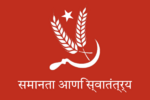Nabiyan National Liberation Front
This article is incomplete because it is pending further input from participants, or it is a work-in-progress by one author. Please comment on this article's talk page to share your input, comments and questions. Note: To contribute to this article, you may need to seek help from the author(s) of this page. |
Nabiyan National Liberation Front नबियान नॅशनल लिबरेशन फ्रंट Nabiyāna nĕśanala libarēśana phraṇṭa | |
|---|---|
 | |
| Leader | Mukesh Dehadray |
| Deputy Leader | Alia Bhagat |
| Founded | 1934 |
| Ideology | Socialism Reformism Anarchism |
| Political position | Left-wing |
The Nabiyan National Liberation Front (Thrakur: नबियान नॅशनल लिबरेशन फ्रंट, Nabiyāna nĕśanala libarēśana phraṇṭa) or simply the NLF, is a revolutionary, socialist political party and rebel group operating within Nabiya. Formed by 1934 as a union of the Nabiyan Communist, Nationalist and Republican parties as an attempt to fight for Nabiyan independence against Rythene and Tyrnica the group has since evolved into a anarcho-socialist revolutionary group occupying areas of southern Nabiya and current engaged in an on-and-off conflict against the Senapati-led government of the Arani Empire.
Organisation
History
Ideology
Administration
Leaders
The Leadership of the National Liberation Front has evolved over time with the type of leadership and method of election changing based on amendments to the party's constitution. Originally, the NLF had no designating leader and instead operated with a leadership council made up of all three independent party leaders. Each leader would share authority over the group with any decisions or amendments to the party's constitution requiring unanimous agreement between all three.
As the independence struggle deepened however this proved unworkable leading the constitution to be amended to include a rotating presidency. Under this system each party, the President of the NLF would serve a 4 year term which would rotate between candidates from the Nationalist Party, Nabiyan Republican Party and Communist Party of Nabiya. This system of a rotating presidency existed between 1938 and 1952 when it was replaced by a system of election by committee from all parties in the coalition without any system of rotation. This amendment greatly benefitted the Communist party which by this point had gained almost complete control over the party committee and membership due to entryist tactics which largely displaced the influence of the Nationalist and Republican groups. Under the current system, the party presidency has evolved from periods of almost dictatorial control during the 1970s and 80s, to the more democratic system seen under the modern anarcho-socialist party today.